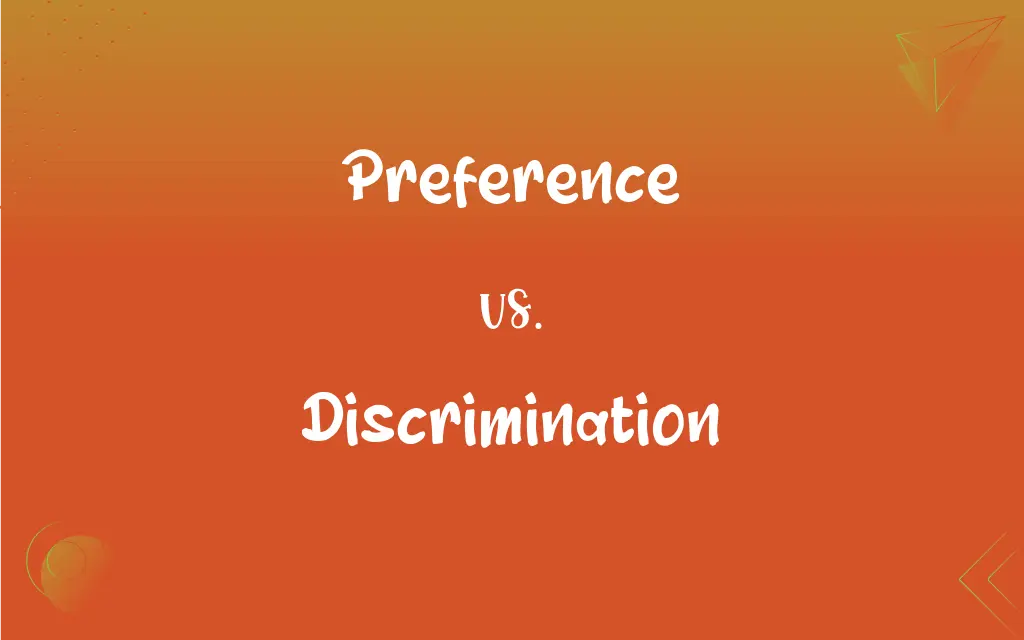Preference vs. Discrimination: What's the Difference?

Preference and Discrimination Definitions
Preference
The selecting of someone or something over another or others
Has a decided preference for travel by train.
Discrimination
The act of discriminating.
Preference
The right or chance to make a choice
The program offers you the preference to use the mouse or function keys.
Discrimination
The ability or power to see or make fine distinctions; discernment.
Preference
Someone or something so chosen or preferred
What are your musical preferences?.
ADVERTISEMENT
Discrimination
Treatment or consideration based on class or category, such as race or gender, rather than individual merit; partiality or prejudice.
Preference
The state of being preferred; favor over others
Applicants who received preference for the job.
Discrimination
Discernment, the act of discriminating, discerning, distinguishing, noting or perceiving differences between things, with the intent to understand rightly and make correct decisions.
Preference
A priority of payment given to one or more creditors by an insolvent debtor.
Discrimination
Differential treatment of an individual or group to their disadvantage; treatment or consideration based on class or category rather than individual merit; partiality; prejudice; bigotry.
Sexual or racial discrimination
Reverse discrimination
ADVERTISEMENT
Preference
The right of a creditor to priority of payment.
Discrimination
(uncountable) The quality of being discriminating; acute discernment, especially in matters of good taste.
Preference
The presentation of a case as ready for consideration.
Discrimination
That which discriminates; a distinguishing mark, a characteristic.
Preference
The formal presentation of criminal charges against someone.
Discrimination
The act of discriminating, distinguishing, or noting and marking differences.
To make an anxious discrimination between the miracle absolute and providential.
Preference
The granting of precedence or advantage to one country or group of countries in levying duties or in other matters of international trade.
Discrimination
The state of being discriminated, distinguished, or set apart.
Preference
The selection of one thing or person over others (with the main adposition being "for" in relation to the thing or person, but possibly also "of")
He has a preference for crisp wines.
Discrimination
The arbitrary imposition of unequal tariffs for substantially the same service.
A difference in rates, not based upon any corresponding difference in cost, constitutes a case of discrimination.
Preference
The option to so select, and the one selected.
Can I keep my preferences when I upgrade to the new version of this application?
Discrimination
The quality of being discriminating; faculty of nicely distinguishing; acute discernment; as, to show great discrimination in the choice of means.
Preference
The state of being preferred over others.
Discrimination
That which discriminates; mark of distinction.
Preference
A strong liking or personal valuation.
Discrimination
Unfair treatment of a person or group on the basis of prejudice
Preference
A preferential bias; partiality; discrimination.
Discrimination
The cognitive process whereby two or more stimuli are distinguished
Preference
(US) To give preferential treatment to; to give a preference to.
Preference
The act of Preferring, or the state of being preferred; the setting of one thing before another; precedence; higher estimation; predilection; choice; also, the power or opportunity of choosing; as, to give him his preference.
Leave the critics on either side to contend about the preference due to this or that sort of poetry.
Knowledge of things alone gives a value to our reasonings, and preference of one man's knowledge over another's.
Preference
That which is preferred; the object of choice or superior favor; as, which is your preference?
Preference
A strong liking;
My own preference is for good literature
The Irish have a penchant for blarney
Preference
A predisposition in favor of something;
A predilection for expensive cars
His sexual preferences
Showed a Marxist orientation
Preference
The right or chance to choose;
Given my druthers, I'd eat cake
Preference
Grant of favor or advantage to one over another (especially to a country or countries in matters of international trade, such as levying duties)






































































